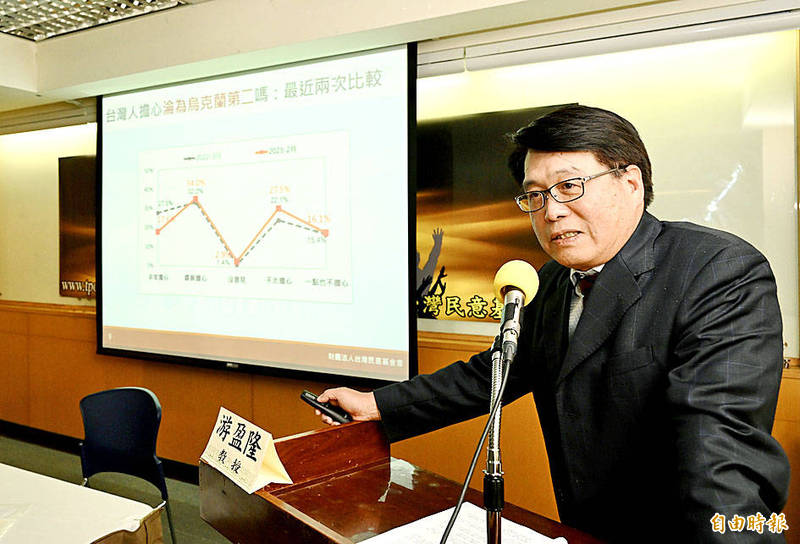《TAIPEI TIMES》 Many not confident in military defense: survey

Taiwan Public Opinion Foundation chairman Michael You yesterday announces the results of the foundation’s latest survey at a news conference in Taipei. Photo: Lo Pei-te, Taipei Times
TESTING ELECTION TEMPERATURE: The survey also showed approval for Hou You-yi over William Lai in a presidential election was 47.4 percent to 32.7 percent
By Shelley Shan / Staff reporter
Nearly half of Taiwanese asked said they were not confident the military could defend the country from a Chinese invasion, while about 43 percent said they believed the US would come to Taiwan’s aid, a survey released yesterday by the Taiwan Public Opinion Foundation showed.
Asked if the military could defend the nation from a Chinese invasion, 47.2 percent of respondents said they were not very confident or not at all confident it could, while 45.3 percent said they were somewhat or very confident, and 7.5 percent said they did not know.
Asked if the US would send troops to Taiwan if China attacked, 42.8 percent said they were convinced or somewhat convinced it would, while 46.5 percent said they were not quite convinced or not at all convinced.
“The results show that Taiwanese are seriously divided on whether the nation has the military capability to fight off a Chinese invasion,” foundation chairman Michael You (游盈隆) said.
“President Tsai Ing-wen’s (蔡英文) administration and the military should make it an urgent matter to boost people’s confidence in the nation’s ability to defend itself,” he added.
In a foundation survey conducted in March last year, nearly 56 percent of respondents said they were not convinced the US would send troops to defend Taiwan, You said.
However, that number fell 9.4 percentage points in the most recent survey, he said.
“This shows that confidence in the US’ commitment to defend Taiwan has gradually recovered following Russia’s invasion of Ukraine... The sentiment of suspicion over the US’ commitment to Taiwan might have passed its peak, but talk that the US might abandon Taiwan has yet to cease,” he said.
The survey showed that 66.3 percent of respondents said that they favored shooting down Chinese spy balloons that fly into Taiwan’s airspace, while about 19 percent said they disagreed with such an approach, You said.
About 65 percent of respondents said they agreed that Russia launched an illegitimate war against Ukraine, and 51.6 percent said they were concerned that Taiwan could become another Ukraine, down from 59.7 percent in March last year, he said.
“Most Taiwanese seemed startled and frightened when the Russia-Ukraine war broke out in February last year. One year after the war began, although more than half of Taiwanese remained concerned that Taiwan could become like Ukraine one day, they seem less panicked and anxious,” You said.
The survey also showed that New Taipei City Mayor Hou You-yi (侯友宜) of the Chinese Nationalist Party (KMT) would have a decisive lead over Vice President William Lai (賴清德) of the Democratic Progressive Party and Taiwan People’s Party Chairman Ko Wen-che (柯文哲) should they face each other in next year’s presidential election.
In a three-way contest, Hou would lead with a 32.4 percent approval rating, ahead of Lai’s 27.7 percent and Ko’s 19.5 percent, You said.
If the race were between Hou and Lai, Hou’s approval rating would be 47.4 percent, surpassing Lai’s 32.7 percent, he said.
A cross-analysis showed that 69.2 percent of Ko’s supporters would vote for Hou and 19 percent would vote for Lai if Ko does not enter the race, You said.
If Ko does not run for president, Hou would benefit the most, putting him in a favorable position to win the presidential election, he said. “Rather than a guaranteed win, Lai’s way to the presidency is expected to be a tough one.”
Compared with last month’s survey, Hou’s approval rating was up 1 percent, while that of Lai and Ko fell 6.3 percent and 2.8 percent respectively, You said.
The telephone survey, conducted on Monday and Tuesday last week, collected 1,072 samples with a margin of error of 2.99 percent, the foundation said.
新聞來源:TAIPEI TIMES





















